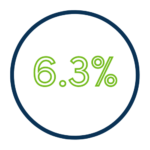With the first half of the year closing, some economists have now turned their attention from Inflation to Recession. I’m sure recently you have noticed rising inflation when you buy almost anything. From gas to groceries, costs are up. This reality was brought home to some when the Dollar Tree store recently changed to the $1.25 Tree store.
Calculating Inflation
Inflation is the decline of purchasing power of a given currency over time. Economists use many ways to measure inflation in the United States – for instance, the Bureau of Labor Statistics uses Consumer Price Index for Urban Consumers (CPI-U) which shows the change in prices for commonly purchased goods (it represents about 93% of the U.S. population).
The things that are measured also vary, but the CPI-U considers food, energy, commodities like cars and clothes, and services like rent and healthcare. Each of these categories can influence inflation and they sometimes exhibit wildly different inflation rates. For instance, gas prices at the pump have almost doubled over the last year or so, food has also increased about 10%, while housing has skyrocketed, and healthcare has remained somewhat steady.
There is ongoing debate over which factors are most relevant and under what conditions while some economists maintain that inflation of between 2-3% is needed for a healthy economy.
Today's Inflation Rate

CPI

Core Inflation

PCE
June rates are not yet available.
While that’s a pretty wide range of percentages for seemingly the same thing, they all tell us the same story: By any measure you choose, inflation is higher than it’s been in quite a while and it’s not healthy for our economy.
What Can YOU Do?
Of course, we can’t control what officials will do to lower the rate of inflation, but what YOU can do is to get a plan in place by meeting with a Wealth Management advisor.
One way to keep up with (or possibly beat) inflation is to maintain a diversified portfolio, which includes investments in the stock market. There are no guarantees as to what the market will do, but historically a well diversified portfolio of quality investments in the market have returned an average of approximately 10%. While the market fluctuates, it may not always look pretty, but traditionally, this results in a long-term successful investment experience. Even though past results cannot be used to predict future returns, we can use the past examples as guidance for current and future outcomes.
Please contact us with your questions and concerns. We are here to help.

Earl Blackmon, CPA
Avizo Group offers Wealth Management for clients who would like assistance in investing, saving, and portfolio diversification. This is an area of need for many of our clients who want to invest but need someone they know and trust to help them. Earl Blackmon holds a Series 7 and Series 66 license.

